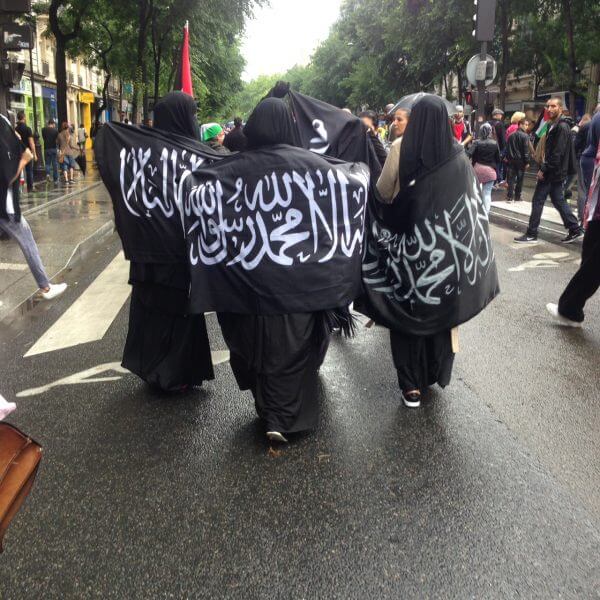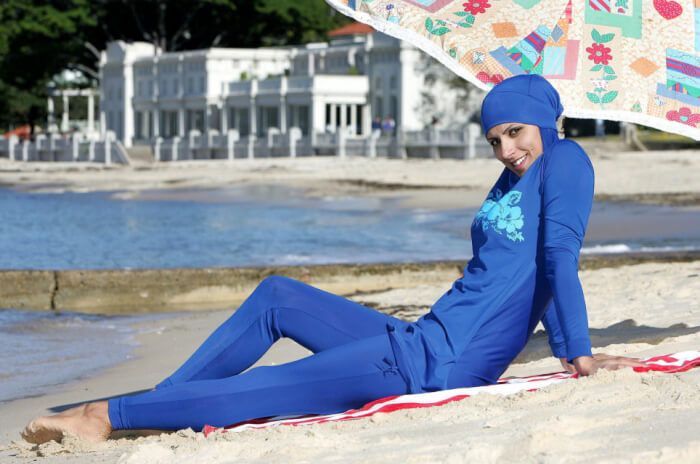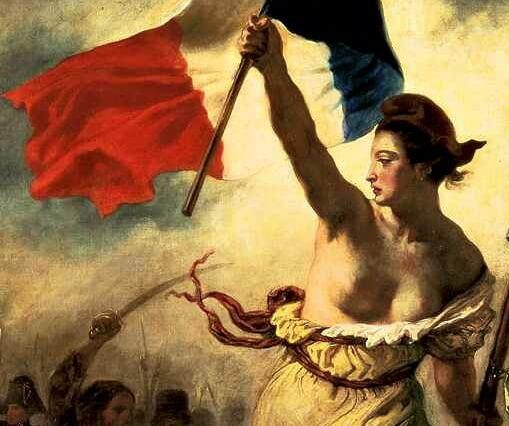West Meets East, the Tale of the “Burkini” in the French Riviera. French Rivera and the Beauty Island of Corsica, from bare breasts beaches to “Burqinis,” questions Marianne’s liberty symbolism and the French Republic “values.”
By Abdennour Toumi

The recent Mayoral decision to ban full body swimwear known as the “burkini” (compound of burqa’a and bikini) has brought the issue of Muslim women’s clothing to the political forefront once again. Meant initially as a statement of modesty by majority of Muslim women in response to France’s Republican values, it is to some a declaration of mutual intolerance, to others, an affirmation of French Eastern anti-sentiment.
Undoubtedly the French anti-Arab and Muslim sentiment has risen exponentially after the killing of Charlie Hebdo journalists in 2015, the November 2015 Paris attacks, July 14th Nice massacre and the horrific crime against Père Hamel, a priest at St. Etiènne-du-Rouvray, Normandy. As a result the Arabs and Muslims are no longer the bearers of an exotic folk tale like the well-known Thousand and One Nights.
The plenitude of bare breasts that might caress the thoughts and define the imagination of Westerns derives from Sheherazad’s light Persian dress and colorful scarf on her silky hair in ray nights set in the famous tale.
Better known as The Arabian Nights, the Thousand and One Nights is an immensely popular tale originating from multiple sources, particularly Indian, Persian and Arabic. So the sensation of curiosity about the “Other” in the West was spread and translated into many languages with Antoine Galland’s altered copy as the basis of further translations.
At that time the literate were delighted to read these plebeian tales leading to the translation of other folk tales not yet moved from their shady position on the literary periphery to the acceptable mainstream.

But nothing these days is going to stop literate and illiterate French laïcité worshippers from their admiration of Marianne’s bust-line at the country’s seaside terraces and beaches during a hot summer. The French and Corsican beaches are envied world-wide because women are allowed topless on the beach where bikinis or less and a lovely tan provide a sublime tableau for the boys.
So until recently that was the dress code on the golden beaches of la Côte d’Azur and l’Île de Beauté, until Sheherazad, like a modern-day mermaid, appeared in an attire that challenged the status-quo of the Provence and all the French beaches, depending on one’s taste and mood.
This re-told tale might be quite artful, but due to its origin it was received with scorn by the literate and the establishment alike. Instead, the selective stupidity of French politicians, both left and right, the arrogant media and the elite combined are using this story-line as a political selling point to score cheap points for next year’s presidential election, and enhancing the dystopians’ argument of the clash of civilizations.

For a Muslim woman who wants to cover her body at the beach or swimming pool — whether to satisfy her doctrinal conviction, entourage moral code or a husband’s machismo — her attire is an attempt to maintain modesty and at the same time get along with Marianne at the beach. But this has become a problem for the Republic’s system institutions who have declared, at least at the Mayoral level that Sheherazad’s “burkini” is inappropriate and therefore banned.
The folk tales that bloomed within French salons in the 1800’s dispersed in the general public awareness, and this literary heritage is precisely where the Westerners reproach the Easterners. In this case Muslims are seen as a group rebelling against French ideals and Republican values that require that women to be free and equal to choose whether to cover or go bare at the beach, whether they want to or not.
People of an earlier time were drawn to the sensational power of stories replete with exotic settings, characters and magic of then popular Orientalism. These aspects still thrill today and continue to have more influence in the West than in their land of origin where the subject matter might be taken for granted.
The advent of the Thousand and One Nights in Europe forged a path of tradition for Western tales to follow. The battle for folk tale recognition had not yet been won, but it had begun, and the authors of the 1800’s were pioneers of the style.
Naturally one can now thank the Easterners for bringing their exotic traditions, food, beliefs and even literary influence to the West and helping spur on the popularity and preservation of the Western folk tale tradition. Further it may be possible to create a really constructive debate on issues that derive from Westerners’ scornful view of Eastern values, asking them to be less noisy and discrete.
Yet in the end perhaps it is simply a matter of everyone living together in peaceful co-existence and enjoying the beauty of the French Riviera, Corsica and beyond.


- The Israeli-Palestinian Conflict: Is the Neither-Peace-nor-Security As-sumption Dominating Again? - June 7, 2021
- Algeria: “I Can See Clearly Now” - August 5, 2019
- Majesty Mohammed VI and General Gaïd Salah Tear Down This Wall! - July 29, 2019

























